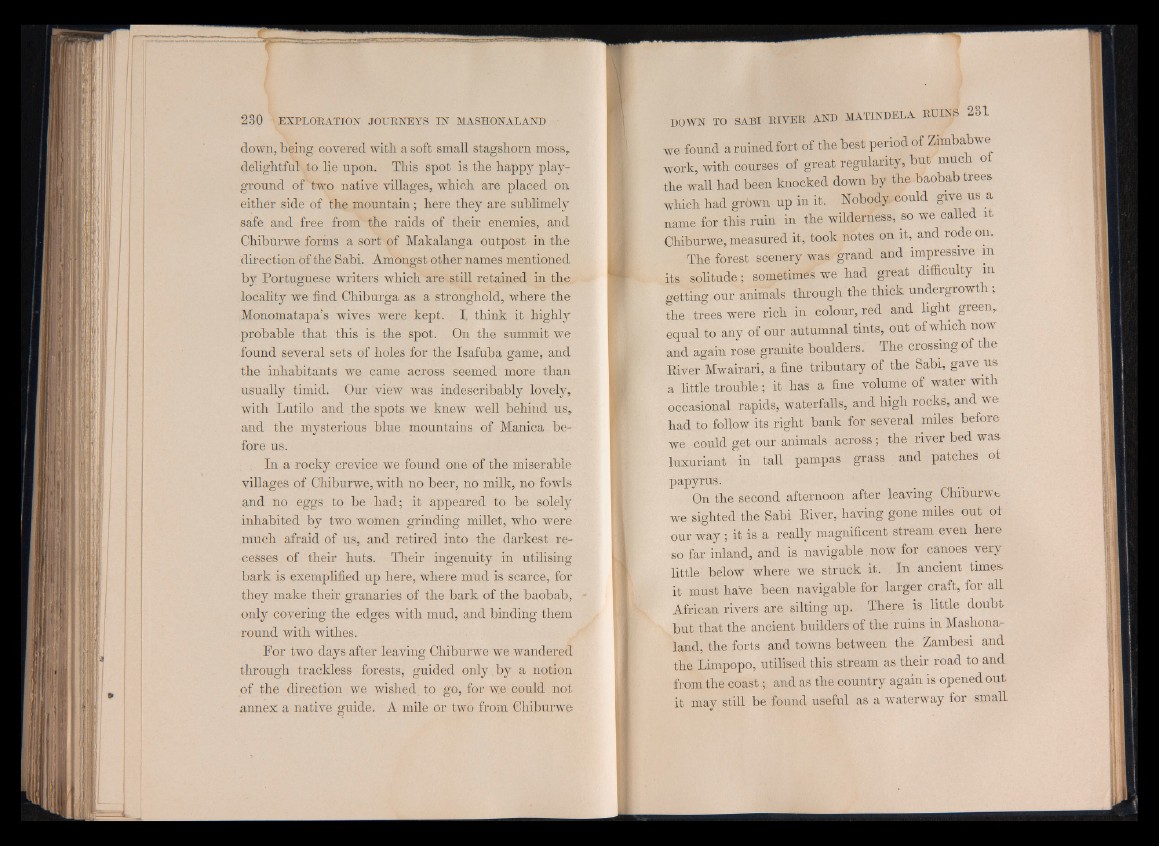
down, being covered witli a soft small Stagshorn moss,
delightful to lie upon. This spot is the happy playground
of two native villages, which are placed on
either side of the mountain; here they are sublimely
safe and free from the raids of their enemies, and
Chiburwe forms a sort of Makalanga outpost in the
direction of the Sabi. Amongst other names mentioned
by Portuguese writers which are still retained in the
locality we find Chiburga as a stronghold, where the
Monomatapa’s wives were kept. I. think it highly
probable that this is the spot. On the summit we
found several sets of holes for the Isafuba game, and.
the inhabitants we came across seemed more than
usually timid. Our view was indescribably lovely,
with Lutilo and the spots we knew well behind us,
and the mysterious blue, mountains of Manica before
us.
In a rocky crevice we found one of the miserable
villages of Chiburwe, with no beer, no milk, no fowls
and no eggs to be had; it appeared to be solely
inhabited by two women grinding millet, who were
much afraid of us, and retired into the darkest recesses
of their huts. Their ingenuity in utilising
bark is exemplified up here, where mud is scarce, for
they make their granaries of the bark of the baobab,
only covering the edges with mud, and binding them
round with withes.
Por two days after leaving Chiburwe we wandered
through trackless forests, guided only by a notion
of the direction we wished to go, for w;e could not
annex a native guide. A mile Or two from Chiburwe
we found a ruined fort of the best period of Zimbabwe
work, with courses of great regularity, but much ot
the wall had been knocked down by the baobab trees
which had grown up in it. Nobody, could give us a
name for this ruin in the wilderness, so we called it
Chiburwe, measured it, took notes on it, and rode on.
The forest scenery was grand and impressive in
its solitude; sometimes we had great difficulty m
getting our animals through the thick undergrowth ,
the trees were rich in colour, red and light green,
equal to any of our autumnal tints, out of which now
and again rose granite boulders. The crossing of the
River Mwairari, a fine tributary of the Sabi, gave us
a little trouble ; it has a fine volume of water with
occasional rapids, waterfalls, and high rocks, and we
had to follow its right bank for several miles before
we could get our animals across ; the river bed was
luxuriant in tall pampas grass and patches ot
papyrus.
On the second afternoon after leaving Chiburwt
we sighted the Sabi River, having gone miles out ot
our way ; it is a really magnificent stream even here
so far inland, and is navigable now for canoes very
little below where we struck it. In ancient times
it must have been navigable for larger craft, for all
African rivers are silting up. There is little doubt
but that the ancient builders of the ruins in Mashona-
land, the forts and towns between the Zambesi and
the Limpopo, utilised this stream as their road to and
from the coast; and as the country again is opened out
it may still be found useful as a waterway for small